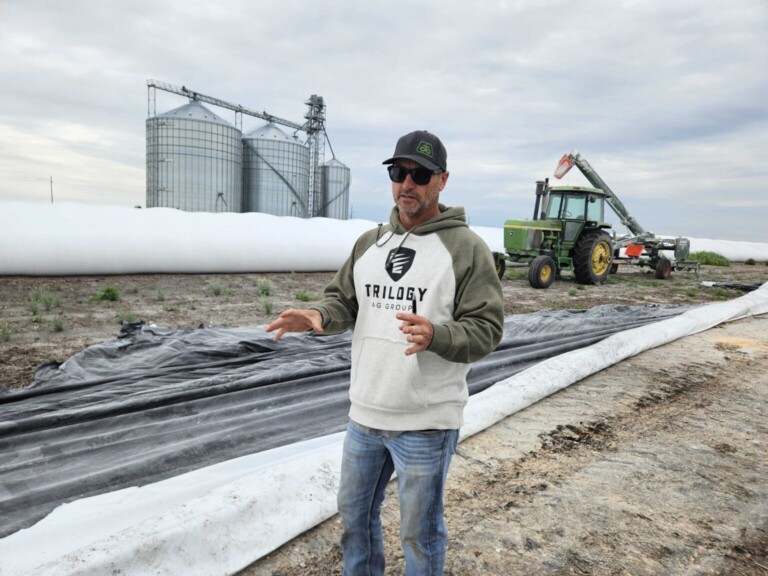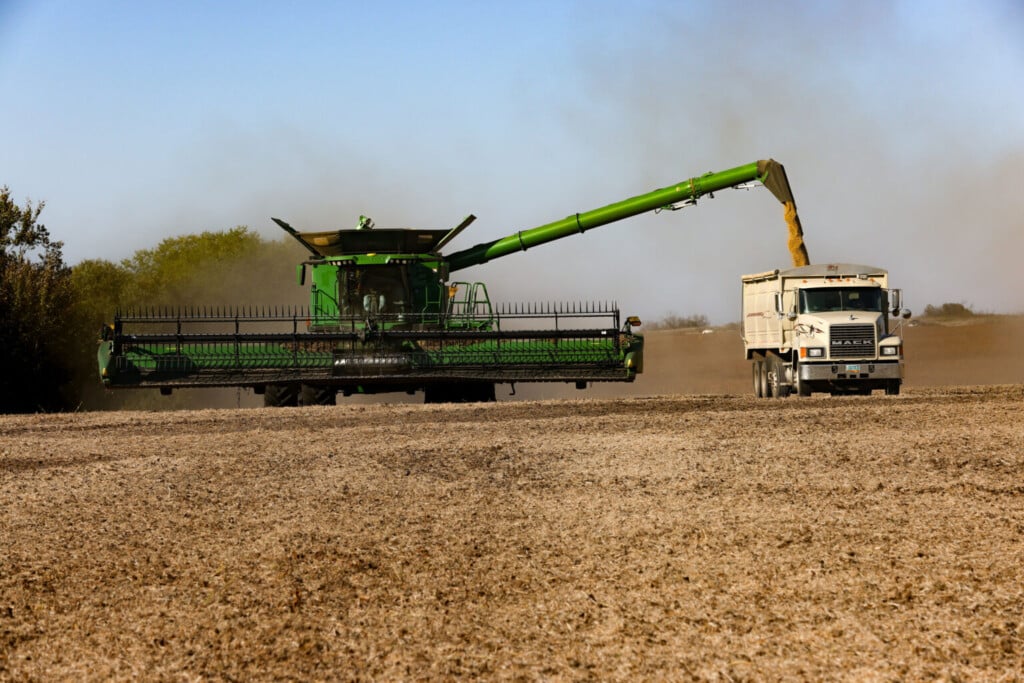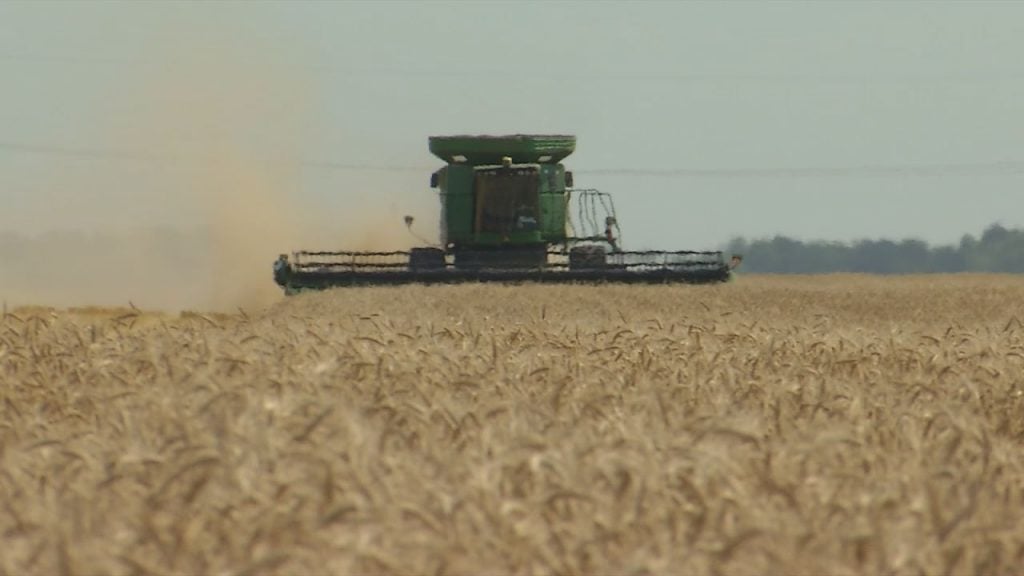Farmers turn to 500-foot plastic storage bags in wake of storm damage

NORTH DAKOTA (North Dakota Monitor) — When June storms demolished three grain bins that Dean Bjornson had planned to use to store much of this year’s crop, his reaction was to bag it instead
He ordered 14 grain storage bags — long plastic tubes that have become more common on North Dakota farms in recent years — to replace the lost storage.
Bjornson said the need for almost-immediate storage and the cost of putting up new grain bins made the decision an easy one.
“Grain bins are like gold,” Bjornson said. “It’s like two bucks a bushel to put up a grain bin, and when you can put it in a sack for 6 cents (per bushel), that’s just good math.”
Bjornson was renting bins just outside Valley City. Having the storage on his farm near Eckelson instead of about 20 miles to the southeast would be another big advantage.
The storms blew across a wide area, from west of Bismarck to Bemidi, Minnesota, the night of June 20-21. Grain bins, especially those sitting empty, were blown apart. Larger storage facilities, such as grain elevators, also were pounded.
Even though it wasn’t his own bins that were damaged, he hopes to be able to take advantage of a state program created to help farms with short-term grain storage. Farmers, through their banks, can apply for up to a $150,000 loan at 2% interest through the Bank of North Dakota.

A funnel cloud west of the Chad Wendel farm in Barnes County on June 20, 2025. The tornado did not hit the farm but high winds damaged grain bins. (Photo courtesy of Chad Wendel)
Chad Wendel farms just northwest of Valley City and has used grain bags since 2016. He said he used bags while he saved up to build a grain drying and storage system, but still uses bags for additional storage.
He said the farm lost much of its bin storage in the storms but the new drying facility was still up-and-running. He said the bin damage would require him to store about 200,000 bushels of soybeans in bags this year.
While Bjornson and Wendel said the bags are a good short-term option, they aren’t cheap.
Jess Radeck of Agassiz Seed in West Fargo said a 10 foot by 500 foot bag, which can store about 23,000 bushels of corn, costs about $2,000. He said tariffs have driven up the price of plastic.
He said as the popularity of the bags has grown in recent years, farmers can probably rent a machine needed to fill the bags from an elevator or neighbor without having to buy one.
The bags are also a one-time use purchase and leave behind a lot of plastic waste. The 10 foot by 500 foot bag is about 750 pounds of plastic.
Wendel said there is no recycling available.
“One thing I do not like is the garbage,” Wendel said.
Finding a company available to put up grain bins before harvest is unlikely, farmers say.
“I don’t think you’re going to find anybody to build a bin right now,” said Bob Wieland, who farms near Dazey in northern Barnes County.
Wieland said he has been too busy dealing with downed trees to make any decisions about replacing the three grain bins he lost on his farm.
“Trees and trees and more trees,” Wieland said.

Bob Wieland has been cleaning up trees and other debris since a June storm snapped tree trunks and ruined three of his five grain bins. (Jeff Beach/North Dakota Monitor)
Wheat harvest will start in a few weeks. He said the wheat would normally go into a bin, allowing him to choose when he wants to sell.
He said this year, much of his crop will be sold directly to an elevator. Farmers can pay for storage at an elevator but Wieland said he is reluctant to do that.
“I’ll take what it brings in the fall,” Wieland said.
One of the facilities he sells to is at Pillsbury in Barnes County, owned by the Arthur Companies. The Arthur Companies announced it will build 5 million bushels of new bunker storage and significantly expand grain drying capacity ahead of harvest at Pillsbury and Ayr in western Cass County.
At a press conference announcing financing options, James Burgum, CEO of the Arthur Companies, thanked North Dakota Gov. Kelly Armstrong and other state leaders for their responsiveness.

Damaged grain bins stand a farm in northern Barnes County on July 16, 2025. A line of storms in June damaged many grain storage facilities in North Dakota. (Jeff Beach/North Dakota Monitor)
“The flexible financing options through the Bank of North Dakota will be critical to ensuring that we can rebuild our infrastructure quickly and limit the impact of growers,” Burgum said.
He said the company was committed to filling the need for grain storage left by the storm.
“We know that a lot of growers that we work with as a commercial grain handling facility are looking to us to respond,” Burgum said.
While there were bins that were blown over, some farms and elevators suffered damaged grain-handling systems and equipment such as grain dryers.
Michael Goetz, a project manager for Gateway Building Systems in West Fargo, said the phone started ringing after the storm.
“The floodgates just opened for repair requests,” Goetz said.
Wieland said long-term storage fixes are a long way off.
“It’s going to take years,” he said.
(Story written by Jeff Beach – North Dakota Monitor)






